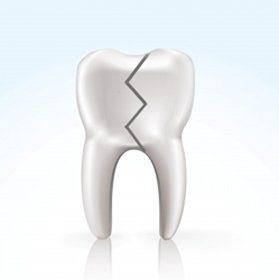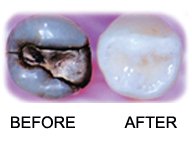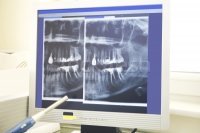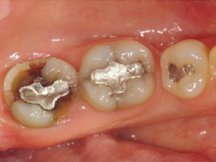|
Cracked Teeth
 Cracked teeth can cause many difficulties for dental patients, including pain, cosmetic embarrassment, and difficulty in biting and chewing. There are several different types of dental fractures, the most common being: --An oblique supragingival fracture which is a crack in the upper portion of the tooth above the gum line. Many times it may not cause pain, therefore the patient may not even be aware of it. --An oblique subgingival fracture is the term used for a crack in a larger portion of the tooth which may extend all the way to where the jawbone starts, and can be very painful as it may involve the nerves. --A vertical furcation fracture is where the tooth actually splits into two or more individual roots. This always involves the nerves and can be quite painful. --An oblique root fracture is always found below the gum line, and may extend all the way down into the jaw. This also may be very painful. --When part of a root breaks off, this is called a vertical root fracture. It is often caused by a tooth root that has become brittle from nerve death and/or a standard root canal treatment. --A vertical apical root fracture is a crack down the middle of a tooth root. Root canal therapy may help to treat and heal this condition. Cracked teeth may be caused by many things, including:
--Composite fillings, because many conventional dentists will do the filling preparation the same way they were taught in dental school for mercury fillings. This means that, again, large amounts of vital tooth structure may be drilled away (even though it's not necessary, as composite fillings have better adhesion) and the composite is wedged in place in such a way that the tooth distorts and eventually cracks and breaks. --Bruxism, or teeth-grinding, which many people do when they are sleeping without even knowing it. Others may grind their teeth together in their waking hours without being aware of it. This is usually caused by stress and anxiety. --Conventional root canal treatments, which kill and remove the nerve in the tooth roots and replace it with a latex substance called "gutta percha." This substance can dry out and cause the roots to turn brittle, which may then crack and split. Cracked teeth may be prevented and/or treated by: --Use of a Nightguard, which is a custom-made, custom-fitted plastic shield that is placed in the mouth over the teeth at night, to prevent damage from grinding teeth. This fits very tightly and securely over the teeth, and is very unobtrusive. --The Laser Dental Filling, which is much stronger and more reliable than mercury amalgam or even composite fillings. --The Laser Nerve Treatment as one alternative to the standard root canal, which doesn't kill and remove the nerve from the tooth root, but instead encourages it to heal and re-grow. --Root Canal Calcification Therapy, which replaces the standard root canal treatment with a therapy that calcifies the tooth root, making it viable so that the body still accepts it as a living structure. This can then prevent the roots from becoming brittle and cracking. --Many times, cracked or damaged teeth can be repaired with inlays or onlays--restorations fitted exactly to the missing areas of teeth, bonded in place with a laser. --Biocompatible, non-metal porcelain crowns may be used where the damage is too severe to be treated with laser dental fillings, inlays or onlays. --Holistic, biocompatible dental implants may be recommended in situations where damage to tooth and/or root structure cannot be repaired. For more information on how we may help you with any problems with cracked teeth, please Contact Us. |


A better, more comfortable and healthier way to fill teeth!

CLICK HERE to find out about our Laser Nerve Treatment, a way to avoid root canals!
 --Mercury amalgam fillings, due to the fact that large areas of healthy tooth structure have to be drilled away in order to wedge in the amalgam, otherwise it won't stay in place. This can then distort the tooth, causing it eventually to crack and decay.
--Mercury amalgam fillings, due to the fact that large areas of healthy tooth structure have to be drilled away in order to wedge in the amalgam, otherwise it won't stay in place. This can then distort the tooth, causing it eventually to crack and decay.